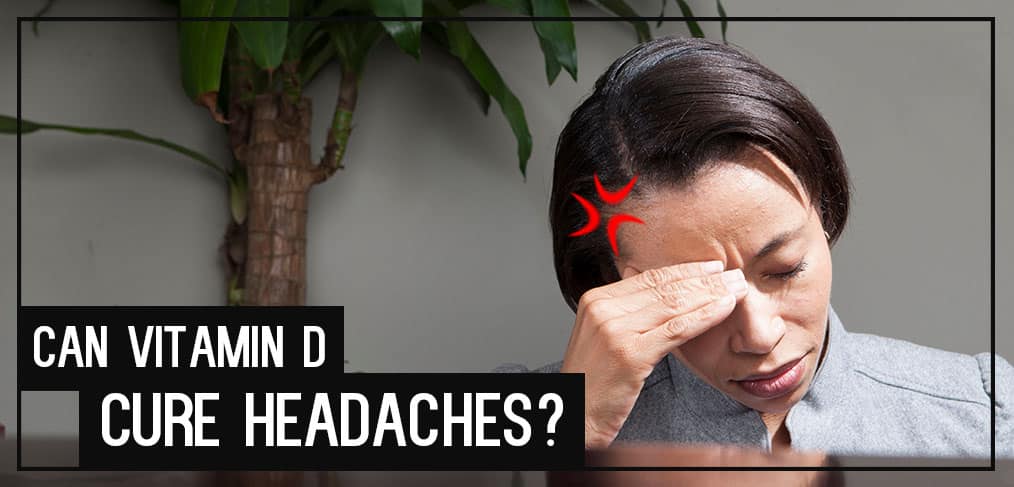
Can Vitamin D Cure Headaches?
In today’s fast paced world, headaches almost seem like an unavoidable byproduct – we’ve all experienced a bad headache or two in our lives, if not more frequently. Some individuals even suffer from a more severe form called migraines. There are numerous kinds of headaches and all can be linked to various reasons or a combination of causes: stress, diet, alcohol and/or food consumption, illness, genetics, and a variety of other reasons. Vitamin D is mostly thought of as needed to build strong bones. But what if Vitamin D is also the answer to the pain in your head? Can Vitamin D cure headaches?
Can Vitamin D Cure Headaches?
Headaches physically occur due to the muscles, nerves, or circulatory system around the neck and head, and neurotransmitters in the brain (or a mix of these). While stress and tension headaches are the most common type, another regularly overlooked culprit is vitamin D deficiency. According to Livestrong, low vitamin D has been linked to headaches and correlated with migraines as well. While many over the counter and prescription medications are made to help relieve headache symptoms, their effectiveness is not long term if you are suffering from vitamin D deficiency. You’re probably wondering then: do I have vitamin D deficiency and can vitamin D cure headaches?
What is Vitamin D Deficiency?
If you have been experiencing headaches, you may now be asking yourself: are your headaches due to low vitamin D? Vitamin D is needed by the body to absorb calcium, necessary for things like bone growth. It is also helps the immune system function properly, fights illness, aids weight loss, and helps combat depression. Vitamin D deficiency is the lack of this particular nutrient in the body. There are many risk factors for vitamin D deficiency such as:
- A lack of sunlight, which is crucial to obtaining this vitamin.
- Dietary issues, such as allergies to foods that contain vitamin D.
- Individuals with dark skin, as melanin (or pigmentation) inhibits the production of vitamin D.
- Obesity, which does not allow vitamin D to circulate properly.
- Malfunctioning kidneys, which otherwise are needed for the output of vitamin D in the body.
Additionally, older people tend to be more at risk than most. In fact, it is estimated that over 90% of seniors have vitamin D deficiency. This is due to their inability to produce ample amounts of vitamin D in the skin, and the reduced exposure to the sun as a result of their increased time indoors.
Symptoms of Vitamin D Deficiency
Vitamin D deficiency has many symptoms, which often go undetected or are thought to be related to another illness. Symptoms vary for each patient, depending on the severity of their deficiency. Common symptoms of Vitamin D deficiency include joint pain, weak or cramping muscles, frequent bone fractures, weight gain, moodiness, fatigue, depression and headaches.
Vitamin D deficiency can lead to serious long term problems if it is not addressed. Bone diseases can develop due to the lack of calcium, some of these include osteomalacia, osteoporosis and rickets. Teeth can become more susceptible to cavities. Autoimmune disorders may also develop due to the immune system’s reliance upon the vitamin. If you feel you Vitamin D deficient, get a Vitamin D test and find out!
How to Manage Vitamin D Deficiency
If you believe you are suffering from Vitamin D deficiency, increasing your levels of Vitamin D can be done at home, naturally. People can increase their sun exposure by simply partaking in outdoor activities, keeping in mind that too much sun can also can cause harm if sunburned. Additionally, Vitamin D supplements are available over the counter and are relatively inexpensive. Another way to get the proper level of Vitamin D is through certain foods. But which ones? Foods that have a good source of Vitamin D include:
- Salmon
- Mackerel
- Tuna
- Sardines
- Caviar
- Raw milk
- Yogurt
- Cod liver oil
- Tofu
- Pork
- Orange juice
- Cereal
- Mushrooms
- Eggs
As always, natural methods are always the safest for treating a deficiency. Consult with a doctor to learn more ways Vitamin D can reduce headaches and benefit the rest of your body. And if your regular pain medication isn’t doing the trick, take some Vitamin D or eat some of the food above. Because the answer to the question of can Vitamin D cure headaches is yes, sometimes.

